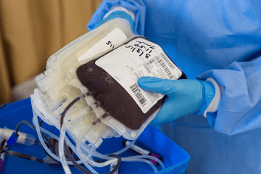Most healthy people can donate whole blood every 56 days, and can donate platelets seven days after giving whole blood. While you might not want to donate blood every two months, doing so can save lives — and can have health benefits for you as the donor.
It’s true. Donating blood can lower your risk of a heart attack, prevent cancer, and protect major organs like the liver from the effects of iron overload. Not only that, but giving blood burns a lot of calories, can improve your mood, and can help you stay informed about your own health. Here’s how often you should give blood, and why.
How Often Can You Give Blood?
As long as you are 16 years old and weigh at least 110 pounds, you can give whole blood safely every 56 days. Once you are 17 years old, you can give platelets and plasma. If you want to donate red blood cells, you must be 17 years old, 5’1” tall, and 130 pounds if you are a man, or 19 years old, 5’5” tall, and 150 pounds if you are a woman.
You can’t give blood if you’re feeling under the weather with cold and flu symptoms or other contagious symptoms, because your blood won’t be safe to give to a recipient. You also can’t give blood if:
- You are pregnant, or have given birth or had a miscarriage or abortion within the previous six weeks;
- You have a viral STI, like herpes or HIV, or hepatitis B or C;
- You have been treated for gonorrhea or syphilis in the past 12 months;
- You have an open wound or cut;
- You’ve gotten a tattoo or piercing within the last year;
- You’ve injected drugs; or
- You’ve engaged in sex work.
You may also be prohibited from giving blood if you’ve traveled recently, especially to countries where there is a high malaria risk. Talk to your doctor before you give blood if you’ve traveled recently.
Why Should You Give Blood?
It probably goes without saying that the primary reason you should give blood is to save lives. The ongoing COVID-19 pandemic has caused perhaps the most severe blood shortage in our nation’s history. That’s because lockdown mandates caused many organizations to cancel their normal blood drive activities in 2020 and 2021, and it just doesn’t occur to many people to give blood on their own. Even those who would give blood on their own are more reluctant to do so right now, out of concern that they could catch COVID-19 or the virulent delta variant.
As a result, doctors and hospitals are having to cancel and reschedule eclectic surgeries for lack of donor blood, and they’re even having to make hard decisions about which emergency patients receive blood. If you’ve had your COVID-19 vaccine, it should be safe for you to donate blood while wearing a mask. Even if you donate only a single unit of blood, you could help up to three people.
When you donate blood, you could save your own life, too. For example, studies have shown that donating blood as infrequently as once a year could lower your heart attack risk by as much as 88 percent, because it lowers your blood’s iron level and that can allow blood vessels to relax, giving your blood more room to flow and making it less likely that you’ll experience a blockage in a coronary artery.
Your body tends to store excess iron from the blood in your major organs, especially your heart, liver, and pancreas. Over time, excess iron stores in the body can cause liver disease, heart disease, diabetes, or other metabolic disorders. Regularly removing some of your blood through blood donation can minimize these dangerous iron stores in your organs, protecting your heart, liver, and other organs from disease and failure. You could even lower your risk of getting cancer, especially if you have a blood or vascular disease like hemochromatosis or peripheral arterial disease (PAD).
Giving blood burns about 650 calories per pint, so while you shouldn’t use it as a weight loss strategy, it does mean that you can snack on that cookie and orange juice guilt-free — or go out and treat yourself to a fancy dessert after to re-energize your body and give it the sugars and fats it needs to replenish the lost blood. The altruistic nature of giving blood can help you feel better about yourself and protect you from depression and even loneliness, thanks to the acquaintanceships you’ll build with staff and donors if you return to donate blood regularly. You could even get an early heads up about any health issues you may have, thanks to the free physical and blood screening that take place before your donation and after your donation is collected.
If you haven’t given blood in a while, it’s time to start. The overwhelmed healthcare system needs blood more than ever, and you’ll be surprised at how much better you feel after helping out.





